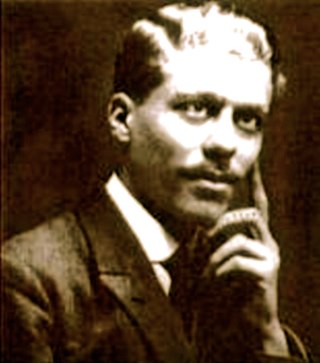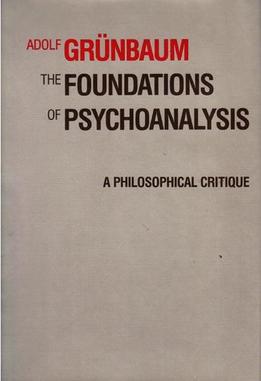Related Research Articles

Edmund Gustav Albrecht Husserl was an Austrian-German philosopher and mathematician who established the school of phenomenology.

Hermeneutics is the theory and methodology of interpretation, especially the interpretation of biblical texts, wisdom literature, and philosophical texts. As necessary, hermeneutics may include the art of understanding and communication.

The Logic of Scientific Discovery is a 1959 book about the philosophy of science by the philosopher Karl Popper. Popper rewrote his book in English from the 1934 German original, titled Logik der Forschung. Zur Erkenntnistheorie der modernen Naturwissenschaft, which literally translates as, "Logic of Research: On the Epistemology of Modern Natural Science"'.
Philosophy of history is the philosophical study of history and its discipline. The term was coined by the French philosopher Voltaire.

Jean Paul Gustave Ricœur was a French philosopher best known for combining phenomenological description with hermeneutics. As such, his thought is within the same tradition as other major hermeneutic phenomenologists, Martin Heidegger, Hans-Georg Gadamer, and Gabriel Marcel. In 2000, he was awarded the Kyoto Prize in Arts and Philosophy for having "revolutionized the methods of hermeneutic phenomenology, expanding the study of textual interpretation to include the broad yet concrete domains of mythology, biblical exegesis, psychoanalysis, theory of metaphor, and narrative theory."
Postmodern theology, also known as the continental philosophy of religion, is a philosophical and theological movement that interprets Christian theology in light of post-Heideggerian continental philosophy, including phenomenology, post-structuralism, and deconstruction.
Danish philosophy has a long tradition as part of Western philosophy.

Emmanuel Mounier was a French philosopher, theologian, teacher and essayist.
Páll Skúlason was a professor of philosophy and former Rector of the University of Iceland.
Mikel Dufrenne was a French philosopher and aesthetician. He is known as an author of existentialism and is particularly noted for the work The Phenomenology of Aesthetic Experience.
Metaphor, the description of one thing as something else, has become of interest in recent decades to both analytic philosophy and continental philosophy, but for different reasons.
The Society for Phenomenology and Existential Philosophy (SPEP) is a philosophical society whose initial purpose was to promote the study of phenomenology and existentialism but has since expanded to a wide array of contemporary philosophical pursuits, including critical theory, feminist philosophy, poststructuralism, critical race theory, and increasingly non-Eurocentric philosophies. SPEP was created in 1962 by American philosophers who were interested in Continental philosophy and were dissatisfied with the analytic dominance of the American Philosophical Association. It has since emerged as the second most important philosophical society in the United States. Alan D. Schrift and Shannon Sullivan are the current Executive Co-Directors of SPEP.

Knowledge and Human Interests is a 1968 book by the German philosopher Jürgen Habermas, in which the author discusses the development of the modern natural and human sciences. He criticizes Sigmund Freud, arguing that psychoanalysis is a branch of the humanities rather than a science, and provides a critique of the philosopher Friedrich Nietzsche.

The Foundations of Psychoanalysis: A Philosophical Critique is a 1984 book by the philosopher Adolf Grünbaum, in which the author offers a philosophical critique of the work of Sigmund Freud, the founder of psychoanalysis. The book was first published in the United States by the University of California Press. Grünbaum evaluates the status of psychoanalysis as a natural science, criticizes the method of free association and Freud's theory of dreams, and discusses the psychoanalytic theory of paranoia. He argues that Freud, in his efforts to defend psychoanalysis as a method of clinical investigation, employed an argument that Grünbaum refers to as the "Tally Argument"; according to Grünbaum, it rests on the premises that only psychoanalysis can provide patients with correct insight into the unconscious pathogens of their psychoneuroses and that such insight is necessary for successful treatment of neurotic patients. Grünbaum argues that the argument suffers from major problems. Grünbaum also criticizes the views of psychoanalysis put forward by other philosophers, including the hermeneutic interpretations propounded by Jürgen Habermas and Paul Ricœur, as well as Karl Popper's position that psychoanalytic propositions cannot be disconfirmed and that psychoanalysis is therefore a pseudoscience.

Freud and Philosophy: An Essay on Interpretation is a 1965 book about Sigmund Freud, the founder of psychoanalysis, written by the French philosopher Paul Ricœur. In Freud and Philosophy, Ricœur interprets Freudian work in terms of hermeneutics, a theory that governs the interpretation of a particular text, and phenomenology, a school of philosophy founded by Edmund Husserl. Ricœur addresses questions such as the nature of interpretation in psychoanalysis, the understanding of human nature and the relationship between Freud's interpretation of culture amongst other interpretations. The book was first published in France by Éditions du Seuil, and in the United States by Yale University Press.
1955 in philosophy

Yvanka B. Raynova is a Bulgarian philosopher, feminist, editor, translator, and publisher. She is full professor of contemporary philosophy at the Institute of Philosophy and Sociology at the Bulgarian Academy of Sciences and director of the Institute for Axiological Research in Vienna. She elaborated a post-personalist hermeneutic phenomenology based on some gnostic ideas. Her works include studies on continental philosophy, phenomenology, hermeneutics, axiology, feminist philosophy, intercultural philosophy, religious studies, and translation studies.
The hermeneutics of suspicion is a style of literary interpretation in which texts are read with skepticism in order to expose their purported repressed or hidden meanings.
In literary criticism and cultural studies, postcritique is the attempt to find new forms of reading and interpretation that go beyond the methods of critique, critical theory, and ideological criticism. Such methods have been characterized as a "hermeneutics of suspicion" by Paul Ricœur and as a "paranoid" or suspicious style of reading by Eve Kosofsky Sedgwick. Proponents of postcritique argue that the interpretive practices associated with these ways of reading are now unlikely to yield useful or even interesting results. As Rita Felski and Elizabeth S. Anker put it in the introduction to Critique and Postcritique, "the intellectual or political payoff of interrogating, demystifying, and defamiliarizing is no longer quite so self-evident." A postcritical reading of a literary text might instead emphasize emotion or affect, or describe various other phenomenological or aesthetic dimensions of the reader's experience. At other times, it might focus on issues of reception, explore philosophical insights gleaned via the process of reading, pose formalist questions of the text, or seek to resolve a "sense of confusion."
References
- ↑ "Paul Ricœur". Inamori Foundation. Archived from the original on 23 May 2013. Retrieved 15 December 2012.